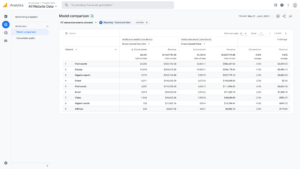Google Analytics 4 is an analytics service that enables you to measure traffic and engagement across your websites and apps.
- Collects both website and app data to better understand the customer journey
- Uses event-based data instead of session-based
- Includes privacy controls such as cookieless measurement, and behavioral and conversion modeling
- Predictive capabilities offer guidance without complex models
- Direct integrations to media platforms help drive actions on your website or app
On July 1, 2023, standard Universal Analytics properties will no longer process data.
GA3 (Universal Analytics) uses measurement based on sessions and pageviews whereas GA4 uses a measurement model based on events and parameters.
Sessions
In Universal Analytics, a session is a combination of page views, events, transactions or more taken by one user within a given timeframe. You can think of a session as a container for all the actions a user takes while on your site.
In contrast, Google Analytics 4 sessions aren’t limited by time. Since it doesn’t create new sessions for source changes mid-session, your session count will likely be lower.
Given this change, your average session time will drastically change too. And remember, average pages per session is no longer measured in GA4.
Bounce rate and engagement rate
One big change is that Google Analytics 4 doesn’t measure bounce rate at all. Instead, you’ll find yourself tracking a new metric: engagement rate.
Instead of only looking at visitors who don’t move to another page on the website, engagement rate also considers the time spent on the landing page. This difference makes engagement rate and bounce rate incomparable.
Google Analytics 4 offers a range of engagement metrics including engaged sessions, engagement rate and engaged sessions per user.
IP anonymisation
Under GDPR, your IP address is considered personal data. In Universal Analytics, you had to actively configure GA to anonymise IP addresses so that you could comply with GDPR legislation.
However, with Google Analytics 4, IP addresses are automatically anonymised.
Landing page reports
Another metric missing as we move from Universal Analytics to Google Analytics 4 is landing page reports.
However, you can easily find out how many times the ‘session_start_ event’ was triggered on a particular page (this is what GA4 uses to trigger new sessions). This is an easy workaround to essentially create your own landing page reports.
App and site monitoring
Mobile app owners rejoice, you no longer have to measure your apps separately from your websites. So with GA4, you can accurately track cross-platform data between your site and app.
Attribution modelling
Attribution reporting isn’t changing much from Universal to GA4.
To view attribution reporting in Google Analytics 4, head to Advertising Snapshot, Model comparison or Conversion paths. Both of these will show you set reports that will help you link your marketing to your sales.

Data retention
While Universal Analytics stores your data pretty much forever, Google Analytics 4’s data expires after 14 months.
In Universal Analytics, you can choose your data retention, with options: 14 months, 26 months, 38 months, 50 months and Do not automatically expire.
But with Google Analytics 4, you only have two options: 2 months and 14 months.
While year on year comparison will still be possible, accessing your historic data will no longer be possible.
However, if you start moving your GA4 data to BigQuery early, then you’ll be able to retain historical data.
And remember, you’ll only be able to access data from the day it was set up. The sooner you get it up and running, the more historical data you’ll have in your reports.